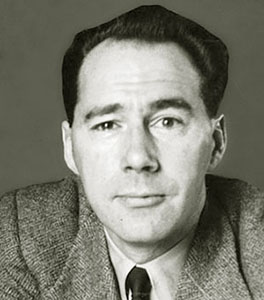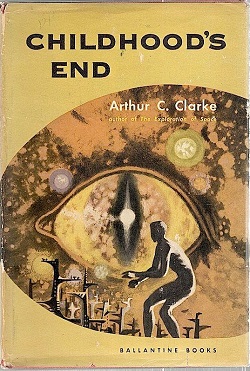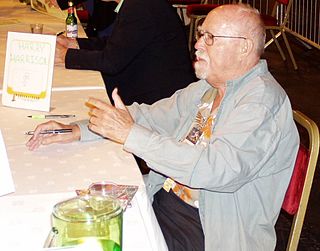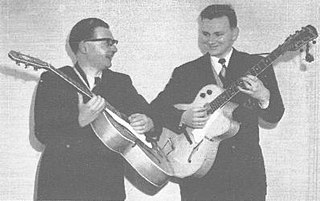
Brian Wilson Aldiss was an English writer, artist and anthology editor, best known for science fiction novels and short stories. His byline reads either Brian W. Aldiss or simply Brian Aldiss, except for occasional pseudonyms during the mid-1960s.

John Wyndham Parkes Lucas Beynon Harris was an English science fiction writer best known for his works published under the pen name John Wyndham, although he also used other combinations of his names, such as John Beynon and Lucas Parkes. Some of his works were set in post-apocalyptic landscapes. His best known works include The Day of the Triffids (1951), filmed in 1962, and The Midwich Cuckoos (1957), which was filmed in 1960 as Village of the Damned, in 1995 under the same title, and again in 2022 in Sky Max under its original title.

Damon Francis Knight was an American science fiction author, editor, and critic. He is the author of "To Serve Man", a 1950 short story adapted for The Twilight Zone. He was married to fellow writer Kate Wilhelm.

Childhood's End is a 1953 science fiction novel by the British author Arthur C. Clarke. The story follows the peaceful alien invasion of Earth by the mysterious Overlords, whose arrival begins decades of apparent utopia under indirect alien rule, at the cost of human identity and culture.

Harry Max Harrison was an American science fiction author, known mostly for his character The Stainless Steel Rat and for his novel Make Room! Make Room! (1966). The latter was the rough basis for the motion picture Soylent Green (1973). Long resident in both Ireland and the United Kingdom, Harrison was involved in the foundation of the Irish Science Fiction Association, and was, with Brian Aldiss, co-president of the Birmingham Science Fiction Group.

Frank Malcolm Robinson was an American science fiction and techno-thriller writer. He was a speechwriter for gay politician Harvey Milk and Milk's designated successor in the event of his death but declined to be appointed to or run for office.

Science Fantasy, which also appeared under the titles Impulse and SF Impulse, was a British fantasy and science fiction magazine, launched in 1950 by Nova Publications as a companion to Nova's New Worlds. Walter Gillings was editor for the first two issues, and was then replaced by John Carnell, the editor of New Worlds, as a cost-saving measure. Carnell edited both magazines until Nova went out of business in early 1964. The titles were acquired by Roberts & Vinter, who hired Kyril Bonfiglioli to edit Science Fantasy; Bonfiglioli changed the title to Impulse in early 1966, but the new title led to confusion with the distributors and sales fell, though the magazine remained profitable. The title was changed again to SF Impulse for the last few issues. Science Fantasy ceased publication the following year, when Roberts & Vinter came under financial pressure after their printer went bankrupt.
Charles Leonard Harness was an American science fiction writer.
Edward John Carnell was a British science fiction editor known for editing New Worlds in 1946 then from 1949 to 1963. He also edited Science Fantasy from the 1950s. After the magazines were sold to another publisher he left to launch the New Writings in Science Fiction anthology series, editing 21 issues until his death, after which the series was continued by Kenneth Bulmer for a further 9 issues.

Farewell, Fantastic Venus is a 1968 American science fiction anthology edited by Brian Aldiss and Harry Harrison. An abridged version was published in the same year under the title All About Venus. It was first published as a direct response to the information returned from the first space probes sent to Venus, especially the first atmospheric probe to return data, Venera 4. The first data was not returned from the surface until Venera 7 successfully landed in 1970.
Galaxy novels, sometimes titled Galaxy Science Fiction Novels, were a series of mostly reprint American science fiction novels published between 1950 and 1961.

New Writings in SF 22 is an anthology of science fiction short stories edited by Kenneth Bulmer, the first volume of nine he oversaw in the New Writings in SF series in succession to the series' originator, John Carnell. It was first published in hardcover by Sidgwick & Jackson in 1973, followed by a paperback edition under the slightly variant title New Writings in SF - 22 issued by Corgi in 1974. The contents of this volume, together with those of volumes 21 and 23 of the series, were later included in the omnibus anthology New Writings in SF Special 1, issued by Sidgwick & Jackson in 1975.

New Writings in SF 26 is an anthology of science fiction short stories edited by Kenneth Bulmer, the fifth volume of nine he oversaw in the New Writings in SF series in succession to the series' originator, John Carnell. It was first published in hardcover by Sidgwick & Jackson in August 1975, followed by a paperback edition issued by Corgi in 1976. The contents of this volume, together with those of volume 29 of the series, were later included in the omnibus anthology New Writings in SF Special 2, issued by Sidgwick & Jackson in 1978.

New Writings in SF 28 is an anthology of science fiction short stories edited by Kenneth Bulmer, the seventh volume of nine he oversaw in the New Writings in SF series in succession to the series' originator, John Carnell. It was first published in hardcover by Sidgwick & Jackson in 1976, followed by a paperback edition issued by Corgi in 1977. The contents of this volume, together with those of volume 27 of the series, were later included in the omnibus anthology New Writings in SF Special 3, issued by Sidgwick & Jackson in 1978.

Dan Morgan was an English science fiction writer and a professional guitarist, mainly active as a writer from the early 1950s through the mid-1970s. In addition to his fiction, he wrote two manuals relating to his musical profession.

Science Fiction: The 100 Best Novels, An English-Language Selection, 1949–1984 is a nonfiction book by David Pringle, published by Xanadu in 1985 with a foreword by Michael Moorcock. Primarily, the book comprises 100 short essays on the selected works, covered in order of publication, without any ranking. It is considered an important critical summary of the science fiction field.

First Voyages is an anthology of science fiction short stories edited by Damon Knight, Martin H. Greenberg and Joseph D. Olander, first published in paperback by Avon Books in May 1981. It is a compilation of the first published stories of twenty prominent authors in the genre, and an expansion of Knight's earlier First Flight: Maiden Voyages in Space and Time, which covered ten of the same stories and authors.

The Paradox Men is a science fiction novel by American writer Charles L. Harness, his first novel. Initially published as a novella, "Flight into Yesterday", in the May 1949 issue of Startling Stories, it was republished as The Paradox Men in 1953. The "science-fiction classic" is both "a tale dominated by space-opera extravagances" and "a severely articulate narrative analysis of the implications of Arnold J. Toynbee's A Study of History." Boucher and McComas described it as "fine swashbuckling adventure ... so infinitely intricate that you may never quite understand what it's about." P. Schuyler Miller described it as "action-entertainment, fast-paced enough that you don't stop to bother with inconsistencies or improbabilities."

Nebula Awards Showcase 2001 is an anthology of science fiction short works edited by Robert Silverberg. It was first published in hardcover and trade paperback by Harcourt in April 2001.

Space Mail is an anthology of science fiction short works edited by Isaac Asimov, Martin H. Greenberg, and Joseph Olander. It contains a series of short stories written in the form of letters, diary entries, or memoranda. The book is broken into three sections, each of which contains stories written in the type of documentation after which the section is named.

















